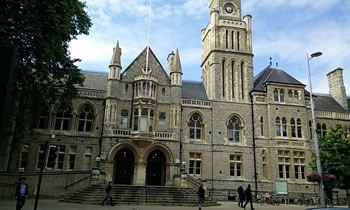Ealing's 73 Million Pounds in The Red
More cuts on the way as council attempts to bridge the gap
More job losses, land search fees for buyers to increase and parking enforcement is to be sold to private car parks - just some of the changes Ealing Council has agreed in an attempt to try and balance the books.

The Council’s cabinet meeting heard last night (Tuesday 14 November) that the budget gap the authority needs to close over the next four years now stands at £73million.
The council blames public funding austerity measures, introduced in 2010, which they say has resulted in 143million less government funding to spend on local services in 2021 than it did at the start of this decade. This is the equivalent of a 64% drop in government funding, which they say is a greater cut than both the London and national average.
The council says it has already made 'efficiency savings' through staff reductions, re-negotiating contracts, consolidating council assets and increasing income through charges for services as well as using its financial reserves.
Last night, proposals for £4.5million in budget reductions and income generation for the next financial year were approved. This includes proposals to delete 38 posts across the council; charging developers for planning advice; increasing local land charge search fees for property buyers; and selling parking enforcement services to private car parks.
A second round of proposals will need to be considered by councillors early in the new year, ahead of the council setting its budget for 2018/19 in February.
As government funding to local councils decreases local services will instead be funded through council tax, business rates and fees and charges for council services.
The council has sought to increase investment in the area and boost the local economy in an effort to create jobs and much needed homes which has helped to increase both council tax and business rates receipts.
Alongside this, the council has embarked on an ambitious programme to transform the way it works. This programme, called Future Ealing, seeks to improve the lives of local people by prioritising the council’s limited resources and reducing budgets against nine key aims.
Councillor Julian Bell, leader of the council, said: “Seven years of swingeing austerity cuts are causing real pain and mean further cuts are unavoidable. We have a growing and ageing population and demand for services is increasing year-on-year.
“Given this, we have set ourselves an ambitious challenge to review services and find ways to improve them with less money; be creative and innovate including harnessing digital technology.
“We have also been working to grow our way out of austerity. Our ambitious regeneration projects have helped secure transport improvements and more decent and affordable homes; and, by encouraging new businesses to locate to the borough, new jobs have been created and more income has been generated from business rates.”
At the same time as facing unremitting central government cuts, the council is also experiencing sustained demand for adults’ and children’s social care and housing, which adds to the pressure on the council’s budget.
Councillor Yvonne Johnson, cabinet member for finance, performance and customer services, said: “Looking after our most vulnerable residents is one of the most vital things we do but it is also the most costly. But, we cannot turn our backs on those who need us the most. Social care is in crisis across the country and we, like other councils, need a national funding solution urgently.
“Although we passed on the government’s social care precept to residents in their council tax bills last year, it simply wasn’t enough to bridge the financial gap and meant we had no option but to use the council’s savings, known as reserves, to fund the shortfall. But of course, you can only use this money once and it will eventually run out.
“We are prioritising what we do to protect the most vulnerable, including trying to keep people healthy and living in their own homes for as long as possible and working to prevent problems like homelessness. This helps people live better lives and reduces demand for expensive services. We also want to build community pride and encourage residents to help look after the borough so that we can protect funding and ensure it continues to be a great place to live, work and visit.”
Leader of the Conservatives on Ealing council, Councillor Greg Stafford disputes Labour's financial claims and said:
'' A year ago, the Council voted unanimously to accept the Government’s four year settlement deal in relation to its main Revenue Support Grant in recognition that Business Rate retention will soon become the main source of funding.
''The deal, which London Councils including Ealing was pushing for, provides Council’s with certainty over its budgets until 2019/20 along with a degree of protection from any further reductions in excess of those already announced.
''On this basis, I am confident that people will see Labour’s claims for the red herring that it is: a mask to hide their incompetent financial management and decline in services.”
All cabinet decisions are subject to call in for a period of five working days from the date of publication of the minutes of the meeting.
November 15th 2017
Related links
|